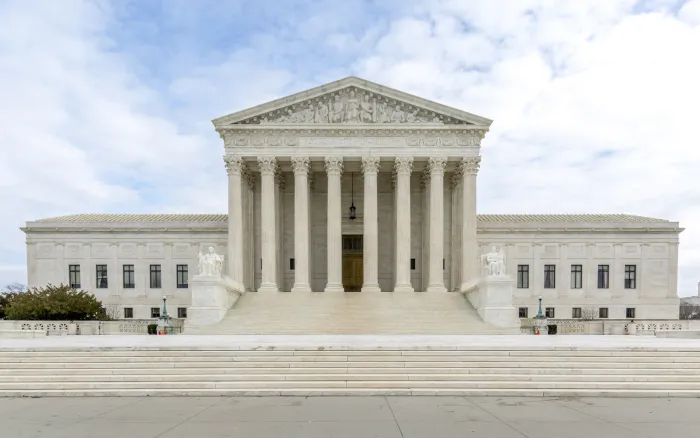The U.S. Supreme Court will decide whether the appeal of a denial of a motion to compel arbitration mandates that the district court stay litigation pending appeal or permits the district court to decide on a case-by-case basis whether to put the proceedings on hold in Coinbase Inc. v. Bielski, No. 22-105.
The Court will resolve a 6-3 federal circuit court split on the issue. The U.S. Courts of Appeals for the Third, Fourth, Seventh, Tenth, Eleventh, and D.C. Circuits have ruled that district courts must halt the proceedings when a party has filed a “non-frivolous” appeal challenging a decision denying a motion to compel arbitration. They reasoned that a court no longer has jurisdiction over the matter once such an appeal is filed. The Second, Fifth, and Ninth Circuits held that district courts have the discretion to decide whether to stay the case or proceed with the litigation while the appeal is pending.
Consumer Class Action
The underlying case, a consumer class action against cryptocurrency platform Coinbase, Inc. under the Electronic Funds Transfer Act, was filed in a federal district court in California. Coinbase filed a motion to compel arbitration pursuant to the arbitration provision in its user agreement. The district court denied the motion, finding the arbitration provision substantively unconscionable under California law.
Coinbase filed an interlocutory appeal with the U.S. Court of Appeals for the Ninth Circuit challenging the district court’s decision. Coinbase also filed a motion to stay the action pending the outcome of the appeal. Under Ninth Circuit law, however, “[d]enial of a motion to compel arbitration does not result in an automatic stay of proceedings pending appeal of that order.” Instead, courts within the Ninth Circuit decide on a case-by-case basis whether to issue a stay pending appeal. Applying the four-factor analysis used within the circuit for evaluating such motions to stay, the district court denied the motion. Coinbase then filed a motion at the Ninth Circuit to stay proceedings in the district court pending the appeal, which was denied.
U.S. Supreme Court Takes Up Case
The U.S. Supreme Court agreed to consider the following question: “Does a non-frivolous appeal of the denial of a motion to compel arbitration oust a district court’s jurisdiction to proceed with litigation pending appeal?”
In Griggs v. Provident Consumer Disc. Co., 459 U.S. 56, 58 (1982), the Supreme Court held that an appeal “divests the district court of its control over those aspects of the case involved in the appeal.” Citing this precedent, Coinbase argued that when the issue on appeal is arbitrability, the very issue in dispute is whether the matter may still proceed in the district court. “A district court lacks jurisdiction to proceed with a case while the court of appeals is deciding whether the case belongs in litigation to begin with,” Coinbase urges.
Coinbase also argues that the Federal Arbitration Act (FAA) itself lends support for this position and for the conclusion that the Ninth Circuit’s minority approach of allowing courts to exercise discretion over whether to stay proceedings is incorrect. “Congress in the FAA would not have granted parties the right to an immediate interlocutory appeal of refusals to compel arbitration if Congress had contemplated that litigation could proceed while the appeal was pending,” Coinbase argues.
***
When a party seeks to compel arbitration under the terms of an arbitration agreement, that party is challenging the court’s jurisdiction over the dispute. Therefore, should a district court continue to preside over a litigation — moving forward with costly discovery and motions — when its jurisdiction over the dispute is in question? The U.S. Supreme Court’s eventual decision in this case could effectuate the purposes of the FAA: ensuring that courts enforce agreements to resolve disputes through private, binding arbitration. The Court is expected to render its decision later in 2023.
Please contact a Jackson Lewis attorney if you have questions about the issue before the Supreme Court or about court enforcement of arbitration agreements generally.
© Jackson Lewis P.C. This material is provided for informational purposes only. It is not intended to constitute legal advice nor does it create a client-lawyer relationship between Jackson Lewis and any recipient. Recipients should consult with counsel before taking any actions based on the information contained within this material. This material may be considered attorney advertising in some jurisdictions. Prior results do not guarantee a similar outcome.
Focused on employment and labor law since 1958, Jackson Lewis P.C.’s 1,000+ attorneys located in major cities nationwide consistently identify and respond to new ways workplace law intersects business. We help employers develop proactive strategies, strong policies and business-oriented solutions to cultivate high-functioning workforces that are engaged and stable, and share our clients’ goals to emphasize belonging and respect for the contributions of every employee. For more information, visit https://www.jacksonlewis.com.



